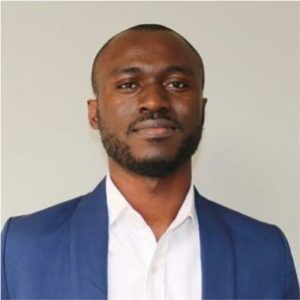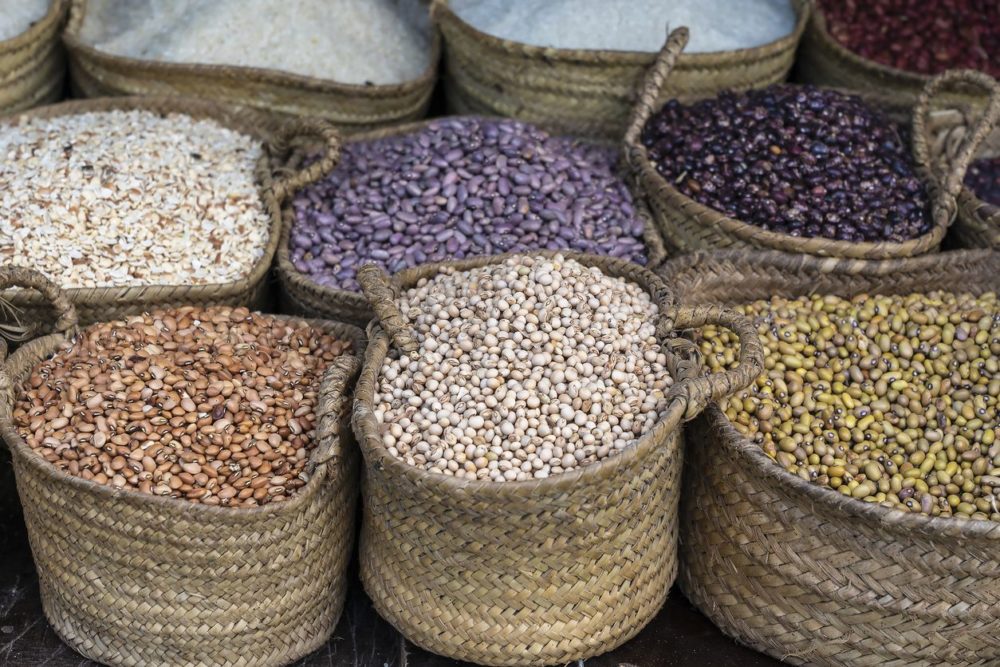“People can save for mobile phones or a wedding coming up and this is a behavioral thing,” says Ahmed Umar, co-founder at Nigerian agrifintech startup FoodInsure. “Why not create something that enables people to save strictly for food?”
This is exactly what FoodInsure aims to do when it officially launches its digital food savings platform in a couple months. The platform, accessible with a mobile device, insures users’ savings for food and connects those individuals with both smallholder farmers and cheaper food prices. The system also benefits Nigerian farmers, who often grapple with a lack of market access. So far, FoodInsure has sourced food from 100 smallholder farmers.
Umar himself has a background that spans building construction technology, project management and the non-profit world. His work includes steering incubation programs for agrifoodtech startups in the West Africa region, particularly Benin, Togo and Nigeria. Project management also allowed him to dabble in access to credit for startups by virtue of working with non-profits.
Below, Umar (AU) tells AFN more about the original inspiration behind the platform and how it is already helping consumers save for food.

AFN: What problem in the food industry is FoodInsure trying to solve?
AU: Around September 2020 my co-founder Femi Oluwagbemi and I were going back to work after the [Covid-19] lockdowns. We were colleagues at the time and we were just curious about what’s happening, like the impact of Covid on the economy and people.
We realized that food was a critical thing people struggled with. [During lockdowns] people lost their means of income and a lot of people couldn’t go out to work.
We knew people are already saving in Nigeria — there are really great apps enabling people to save, but people still don’t save for food. People save for mobile phones or a wedding coming up and this is a behavioral thing.
That’s when we thought, why not create something that enables people to save strictly for food? And when there’s an emergency they can rely on it? That’s when we decided to build a product that could help improve food security.
We also saw there was limited access to finance for food producers, and that there was a disconnect between supply and demand which caused a lot of issues post-harvest.
AFN: How does FoodInsure work?
AU: An individual can make a deposit on the platform, like they would at a bank, but it’s strictly a deposit for food. They can’t cash it out or transfer the money.
The deposit is then insured by the The Nigeria Deposit Insurance Corporation (NDIC), which is a body that administers Nigeria’s deposit insurance system.
Beyond insurance, FoodInsure offers an online marketplace for smallholder farmers. Users who deposit on the platform can then purchase these food items like rice and maize, which they save for, for a designated period of time which is either six or nine months.
It’s basically a pre-order for food and users have guaranteed supply and that’s our value proposition, where they can even get the food at cheaper rates.
We also have data for demand which we don’t want to just sit idle. We want to take this data to the banks and show them the guaranteed demand for rice or maize so they can use it to extend credit to the farmers.
AFN: How will you be able to provide food at lower costs for the users?
AU: Our plan is to launch in Lagos, an urban setting where people don’t usually have access to farms and a lot of what is being consumed is brought from other parts of the country. And that means mark-ups for the food.
We are saying that we guarantee food at a rate that’s a little lower than market rate, because we have enough time to source it between the time of deposit and turn around time. During this time we’re also establishing relationships with large off takers and existing regional food banks or just wholesalers that can give massive discounts.
AFN: Most urban dwellers would have access to smartphones. What about those who don’t or those outside of cities like Lagos?
AU: We are careful of the fact that not everyone in even in urban areas would bind to this solution.
So to include the rural unbanked people, we want to create a USSD platform which is the natural fintech go-to approach. We also plan to work with locally placed agents and to roll out our product and make it accessible to users there.
AFN: Where are you in your journey of building FoodInsure?
AU: We are finalizing our actual product which will be ready in two months or so. At this point we’re tidyng up things, doing outreach mainly to friends and colleagues to let people know what we’re doing and what’s coming up and getting feedback from them.
AFN: Now that you’re testing, what is the level of acceptance from potential consumers?
AU: I was on TV a few weeks ago talking about FoodInsure and before I even left the studio, I had received multiple messages and emails asking where they can sign up.
If you take a poll or a sample of people, especially Nigeria, you’ll see that a lot of people are not even interested in the traditional banks, because fintechs are giving way better services. They’re constantly innovating and solving problems.
We think people want to see how [FoodInsure] will work and how they can be a part of it. Now we want to finalize our product and even hold physical events where people can get to know about FoodInsure, sign up and give us their feedback.
AFN: What impact would you like FoodInsure to have in Nigeria’s food ecosystem?
AU: What we want is that there is guaranteed access to food supply for people. But while we are solving that, we are also solving some root-cause problems around lack of savings meant just for food.
The big picture for us, is to see that we are mobilizing enough capital and finance for food production.
AFN: What kind of support would you want to see in your industry?
AU: I’d like to see some patient capital or research financing coming into this space.





